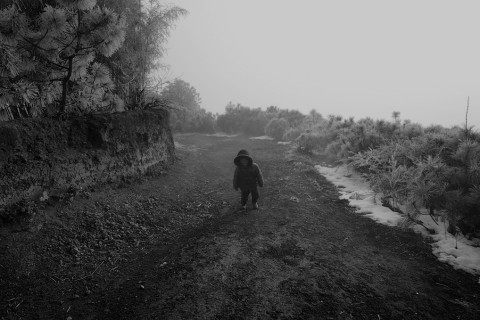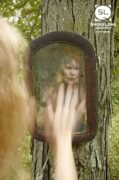Later, he won’t be able to say why he stopped his truck.
Was it the grim set of the woman’s jaw? Was it the trio of them: daughter, mother, and grandmother, each too young to be the elder of the other, like dolls in a mold that had gotten mixed up? Was it the porch, how it careened above the hill, boards gone blue and splintered with rot? If there were stairs leading up to the house, he couldn’t see them. Maybe they had withered away in the weeds.
Larch killed the engine. He had his camera in his hand already like an apology. I come in peace, I have a job. A mask you hide behind, Kristen would say. But Kristen wasn’t here. He stepped out of the truck he had parked half in a ditch. The country road was narrow, but nobody came by.
The women regarded him from the porch.
With his free hand, Larch waved.
“You lost?” the middle woman said, the mother.
“No,” Larch said. “I’m a photographer.”
“A what?” the grandmother said.
He lifted the camera, a little black toad in his palm.
The two older women sat in metal folding chairs, propped against the house. The mother wore a sweatshirt, gray as the sky; the grandmother, a denim work shirt. Neither warm enough for this weather. It was mud season, the Appalachian bastard of spring. Mud clapped the belly of Larch’s truck, the women’s sneakers.
Nobody answered the grandmother.
“You from the college?” the mother said.
He was. An adjunct, but he didn’t have to mention that. What would that mean.
He loved their faces. The way they closed in like rotted fruit, chins folding into lips as loose as bedclothes.
The daughter had said nothing. Her shoulders were hunched, hands in the pockets of her pink hoodie, bunched into fists. She stood against the house. Larch wondered if it would fall over if she leaned too much. Her hair hid most of her face. She was maybe fifteen. It was hard to tell.
He had learned that about Ohio. The hollers held mobile homes scorched on the ends like candles, shacks with an unknowable amount of kin but no running water or heat, the pipes burned for metal; water fetched from a spring.
Not enough to eat did things to your body: hollowed it, swelled it. He tried to tell that to his students. What an opportunity you have, to know this suffering. He had pitched it to Kristen as a pastoral place. They had come from Chicago, seen their first cow.
He wanted a picture of the three of them. “I’m doing a class on portraits,” he explained. “It would be great if I could bring in a shot of you, could show the students.”
“You want a picture?” the mother said. She smoothed her palms down the sides of her white part. Her hair, flat and black-gray, remained unchanged.
“Ohh,” the grandmother said. She clutched her chicken chin.
“You’ll want my daughter in this. Luchele!” the mother yelled for the girl standing right next to her. “Straighten up.”
This was enough of an invitation to Larch. He slung his camera around his neck, and hiked up the hill, holding onto saplings for support. The house nested in the woods as though it had always been there. When the trees were full, it might disappear completely. It had almost rotted back: wood to wood pulp again.
“How do you want us to pose?” the mother said.
The daughter took her hands out of her pockets.
“Don’t pose,” Larch said. “I want you just as you are.”
Show the truth, he told his students. He had told Kristen: fresh eggs, hills with red barns, making dinner. He had shown her: nights alone, in darkrooms with his female TAs while his phone lit up his pocket, no work for Kristen, no other wives of the other adjuncts—kids just starting out, decades younger than him, without failed careers behind them. Kristen started crying at the farmers’ market, at the donation stand where volunteers collected produce for the pantry.
“You want her,” the mother said. “You want a picture of her.”
“She’s the prettiest,” the grandmother cackled.
The daughter smiled, forced and craggily. No braces glittered. She said through clenching: “What’re these for? Facebook?”
“No,” Larch said. He thought he had been over this. He snapped a picture. “I’m a photographer—”
“Are you a model scout?”
“You need to pay for these pictures,” the mother said. “Stop posing, Lu. You can’t take my baby’s face without payment.”
“I’m not taking—” Larch said.
“I’m worth a lot,” the daughter said. “Ain’t I?”
The mother held out her hand, like they had agreed, like Larch would slap something down.
“I can send you a copy.”
“I don’t want no copy. Pay me what you owe me. Or you can’t take my baby’s face.”
Larch let his camera fall. He began to back away. The way down the slope to the truck was more difficult than climbing up had been. He slid, the camera banging against his chest. Now all the women were standing on the porch. The daughter stormed into the house with the snap of a screen door.
The mother began to scream, “Come back here! Give those pictures back!”
Give it back, give it back, he heard Kristen say. She meant the years, she meant the children they were supposed to have together, children it was too late to have now with anyone else, anyone who loved her. She meant her life. Give it back. Take me back.
In the rearview, he saw her: running barefoot, down the road.

Notes from Guest Reader Sara Lippmann
‘What You Owe’ was one of the first I read during my guest stint. I knew it was a knock out, a masterful work of narrative control driven by a searing selectivity of detail, but I didn’t want to decide too soon. All week, I kept returning to it, to Larch, Kirsten, the voices of this family of women. I’m a sucker for a ‘world in a grain of sand’ story, and this small moment of confrontation is an urgent microcosm of our particular cultural moment. The deep saturation of place and its intermingling of want are palpable. The way Stine brilliantly shades in just enough while leaving room for the reader feels like an enormous generosity for a story that hinges on themes of scarcity.


 Included in the price of SmokeLong Fitness:
Included in the price of SmokeLong Fitness: